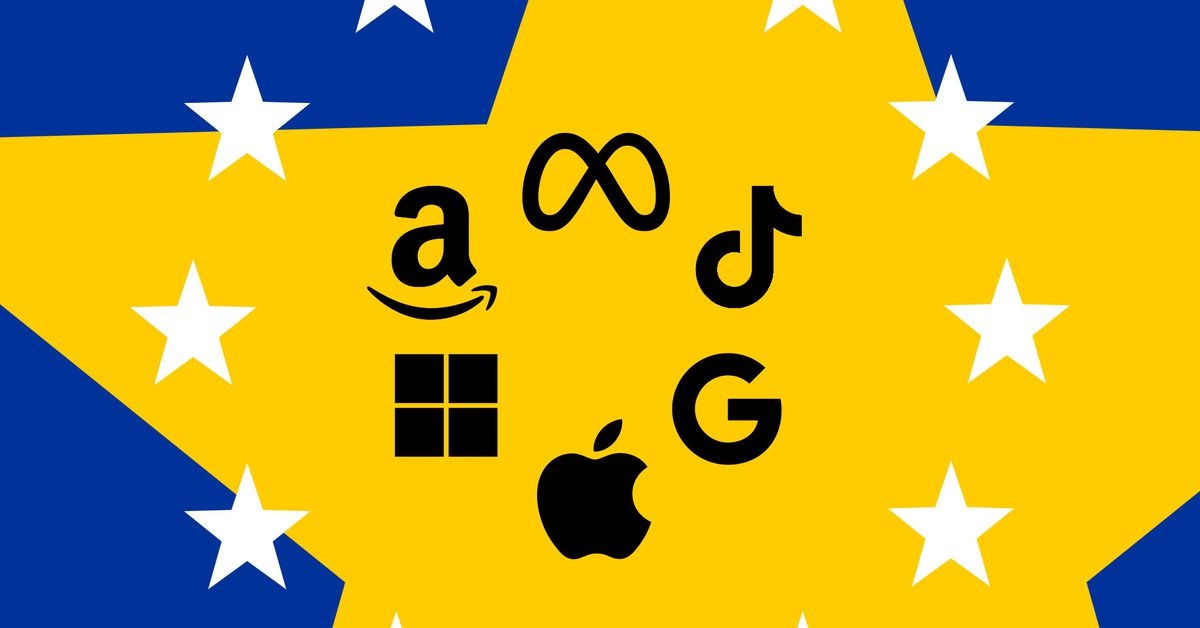
Europe is breaking the hold of the big tech companies
Google, Alphabet, and the DMA: Opening up the Walled Garden of Big Tech, and How Apple Will Open Up its Core Service Platforms
Big Tech’s strategy towards the DMA is to make changes that seem to open up their walled gardens, but that are not appealing to businesses and users, according to von Thun. The EU Commission should use feedback from businesses that will benefit from the inadequate measures, to push the other side to do better.
The European Commission presumes a platform is a gatekeeper if it meets two conditions. It must have an average market cap of 75 billion dollars in the last fiscal year and an annual EU revenue of at least 7.5 billion each year for the last three years. It must have at least 45 million active users per month in the EU and at least 10,000 yearly active business users in each of the last three fiscal years.
The commission has identified certain services that it believes are in line with the rules of the DMA. Gatekeepers that fail to comply with the rules can face fines of up to 10 percent of global revenue, and up to 20 percent for repeat infractions.
Alphabet has a sprawling empire, stretching from a dominant search engine to a major web browser and popular mobile operating system, with many services interlinked to augment their power. It has the widest range of covered services under the DMA.
In January and March, the company made changes that affected everything from sharing data to searching for EU users. The highlights include:
Alphabet’s proposed changes have displeased certain competitors, particularly smaller, specialized search platforms. Online reviews platform Yelp recently claimed the search changes not only “violate the DMA’s prohibition against self-preferencing, they actually increase the rate at which users will remain within Google’s walled garden.” Megan Gray, former counsel for rival search engine DuckDuckGo, has questioned the entire concept of choice screens as an effective vehicle for promoting competition. The CEO of a company that is sued by the internet giant for antitrust violations in the US, has objected strenuously to its payment framework. So we probably haven’t seen the end of questions over Alphabet’s dominance — but it’s staked out its starting ground.
Thanks to its expansive mobile walled garden Apple is one of the highest-profile targets. The discussion has centered on how far it will take to open up the core platform services of theiOS OS,Safari web browser, and App Store.
On January 25th, the company announced that it would be introducing several changes in the iOS 17.4 update to abide by the EU’s new rules, which include:
That isn’t to say these changes are being made willingly. Apple has argued that it operates five separate Stores instead of a single platform, which would avoid the EU regulation. While that gambit wasn’t successful, it did convince the EU commission that iMessage doesn’t qualify as gatekeeper service, avoiding requirements to make it interoperable with other messaging platforms.
Given that, companies haven’t exactly lined up to accept Apple’s offer. A handful of third-party app marketplaces have been announced by Epic, MacPaw, and Mobivention, but only the latter claims it’ll be available for iOS users on March 7th, right after the DMA takes effect. Both of the web browsers that are supposedly experimenting with new iOS browsers have yet to announce when they will be available.
Facebook’s operator Meta has a long history of absorbing rival social networks and messaging services. These areas contain all the services covered by the DMA.
Meta launched a 9.99 per month ad-free tier for Facebook andInstagram in March to address the concerns that people had about ads, as well as giving an ad-free tier for all of Meta. An additional fee is added to linked accounts. It also paused ads for users younger than 18, although its long-term plans there are less clear.
The choice to lean on a paid option resulted in a lawsuit from the European Consumer Organisation (BEUC), which claimed the “very high subscription fee” meant users “do not have a real choice.” In January, Meta announced that they would start rolling out some data protection features such as the ability to sever linked Facebook andinstagram accounts.
The most interesting change is the possibility of third-party cross- platform messaging which was announced by Meta last year. Wired recently outlined what this third-party messaging support might look like for WhatsApp and Messenger, and we expect more details as the DMA takes effect.
These changes are in the works despite Meta appealing some pieces of its gatekeeper designation. In November, it argued that Messenger and Marketplace didn’t belong on the list, saying the former was an integrated Facebook feature and the latter a consumer-to-consumer service where Meta doesn’t act as an intermediary. As of this week’s deadline, the challenge remains ongoing.
Amazon.com vs. Microsoft. DMA rules in the EU and implications for ByteDance, a social network and social network
Some sellers complainAmazon has given them an unfair advantage by using a large third-party marketplace and complex data collection system. It has two services that fall under the DMA: its online marketplace and its advertising business.
The new, expanded reports on the Amazon website will be given to advertisers and publishers with campaigns in the EU. These reports contain more detailed information on how much an advertiser is paying for ads, as well as how much a publisher receives from ads displayed on a third-party website or app. The company is offering advertisers the ability to independently verify the success and impact of their campaigns in a privacy-safe, cloud-based environment.
Microsoft’s Windows operating system falls under the DMA’s regulations, and that’s changing how much the company promotes — or lets users avoid — numerous other apps and services inside it.
The changes have already been rolled out to machines in the EEA, and Microsoft is ready for compliance day. We are waiting to see if the add-in will be included in the Windows Search interface. There could be more Windows Widgets providers soon.
The only non-US company that has been designated as a distributor is ByteDance, and its only covered service is the social network TikTok.
ByteDance shared how TikTok plans to comply with the DMA earlier this week. The platform launched an API that will let European users transfer their data to other apps that have registered with TikTok to use the tool. Registered developers can port posts, followers, and other activity from TikTok to their own apps with users’ permission. TikTok said it’s also improved its “Download your Data” tool that lets individual users export and download their posts and other information. And it will have “enhanced data portability solutions” for business accounts.
Max von Thun, a director of Europe and transatlantic partnerships at the Open Markets Institute, said that positioning itself as a challenger to US tech firms may be enough to sway the EU. The bloc hasn’t reached a final decision on ByteDance’s appeal yet, but the rejection means it’ll have to at least temporarily comply with DMA rules when they go into effect in March. The company still hasn’t explained how it plans to do that.
The European Commission needs to approve all of the proposals submitted by the DMA in order to move forward. An EU commissioner said that the bloc would take strong action if it felt solutions being proposed weren’t good enough.
That makes it difficult to gauge how much consumers and smaller competitors actually stand to gain. The power structures that keep companies at the top have not been changed by the proposed changes, according to a senior policy advisor at European Digital Rights. For example, Alphabet must now allow people to remove Google apps on their Android phones — it’s possible this could snowball into benefiting smaller providers, though that remains to be seen.
It’s fine for apps with a limited number of users, but they can quickly accumulate fees if they become victims of their own success. An example provided by David Heinemeier Hansson, creator of Ruby on Rails, shows that Meta needs to pay Apple $136 million a year to host just one photo sharing service.
Apple’s Decision to Embrace Private Workwaves in the EU and Why: A New Perspective on France’s Ruling in Europe
Apple had decided to dump support for PWAs in the EU, even though they said they would blame the DMA. The company decided to backtrack on the decision after facing an EU investigation. PWAs will continue to exist — though they’ll have to be built on WebKit, the engine used by Safari. Apple has responded to the DMA by allowing third-party browsers to use their own engines in the EU. The WebKit used in the browsers will still be used for the download of PWAs.
In Europe, citizens of the European Union live in an internet ruled by foreign powers. Most people in the EU use an American search engine, shop on an American ecommerce site, thumb American phones, and scroll through American social media feeds.
The big US tech platforms brought feudalism back to Europe, according to a new book byYanis Varoufakis. The former Greek finance minister sees little difference between the medieval serf toiling on land he does not own and the Amazon seller who must subject themselves to the company’s strict rules while giving the company a cut of each sale.

